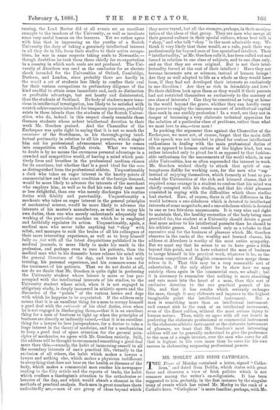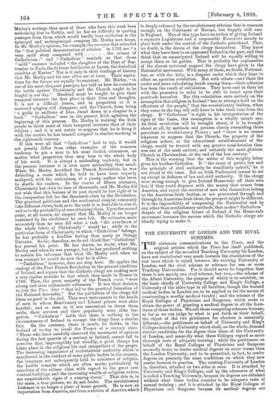MR. MOBLEY AND IRISH CATHOLICS.
THE Times of Monday contained a letter, signed " Catho- lions," and dated from Dublin, which states with great force and clearness a view of Irish politics which is not common among the writer's co-religionists. It has been suggested to him, probably, in the first instance by the singular irony of events which has raised Mr. Morley to the rank of a Catholic hero. "Catholicus" is more familiar, perhaps, with Mr.
Morley's writings than most of those who have this week been welcoming him to Dublin, and he has no difficulty in quoting passages from them which would hardly bear recitation in the episcopal and archiepiscopal company Mr. Morley now keeps. In Mr. Morley's opinion, for example, the excesses that attended the "first political demonstration of atheism" in 1793 are "a very mild story compared with the crimes of Catholicism ;" and " Catholicus " reminds us that these "mild" excesses included "the slaughter of the Days of Sep- tember in Paris, the hideous butcheries at Lyoris, the diabolical cruelties at Nantes." Nor is it only in their readings of history that Mr. Morley and his new allies are at issue. Their aspira- tions for the future are equally inconsistent. Mr. Morley, "in one of his most eloquent passages, has told us how he considers the battle against Christianity and the Church ought to be fought in our day." Mankind must be taught to give their temporal interests the first place in their lives and thoughts.
It is not a difficult lesson, and in proportion as it is mastered religion will disappear, and the Church, from being "a guide to millions of lives, dwarf down to a chapter in a book." " Catholicus" sees in the present Irish agitation the beginning of this process. Mr. Morley is training the Irish people to think more of their temporal interests than of their religion ; and it is not unfair to suppose that he is doing it with the motive he has himself assigned to similar teaching in the eighteenth century.
If this were all that " Catholicus " had to say, it would not greatly differ from other examples of the common tendency to pin a man to his most foolish utterances, no matter what proportion they may bear to the whole body of his work. It is always a misleading tendency, but in the present instance it is even more misleading than usual. When Mr. Morley described the French Revolution, he was defending a cause which be held to have been unjustly maligned, with the enthusiasm of a young author who loves to startle his readers. In the course of fifteen centuries, Christianity has slain its tens of thousands, and Mr. Morley did not wish that this feature of its past should be lost sight of in the compassion felt for the thousands slain by the Revolution. The practical politician and the academical essayist commonly 'take different views, both as to the ends it is desirable to aim at, • and as to the probability of ever attaining them. Upon the second point, at all events, we suspect that Mr. Morley is no longer sustained by the confidence he once felt. He estimates more accurately than he once did what a task "the overthrow of the whole fabric of Christianity" would be ; while to the particular form of Christianity to which "Catholicus" belongs, he has probably a kindlier feeling than many an Orange Unionist. So far, therefore, we do not think that " Catholicus" has proved his point. He has shown, no doubt, what Mr. Morley said when he was younger, but he has produced nothing • to sustain his inference that what Mr. Morley said when he was younger he would do now that he is older.
" Catholicus," however, does not stop here. He applies the analogy of the First French Revolution to the present condition of Ireland, and argues that the Catholic clergy are making now a very similar mistake to that which they made in France in 1789. Then, the great majority of the French curls "were strong and even enthusiastic reformers." It was their decision to join the Tie's Etat " that led to the practical formation of the National Assembly." But the patriotism of the clergy did them no good in the end. They were instruments in the hands of men to whom Reactionary and Liberal priests were alike hateful ; and as soon as it was convenient to throw them aside, their services and their popularity were alike for- gotten. " Catholicus " holds that there is nothing in the circumstances of Ireland to exempt the clergy from a similar fate. On the contrary, there is much, he thinks, in the Ireland of to-day to recall the France of a century since. "Those who have carefully observed the movement of opinion during the last quarter of a century in Ireland, cannot fail to perceive that, imperceptibly but steadily, a great change has taken place M the religious life and sympathies of the people. The increasing impatience of ecclesiastical authority which is manifested in the conduct of some public bodies in the country, the language not unfrequently held to ministers of religion, the hostile remarks which are often made, particularly by members of the artisan class, with regard to the great con- ventual buildings and the increasing wealth of religious orders, are unmistakable signs of a coming storm." That this is, in the main, a true picture, we do not doubt. The revolutionary Irishman is no longer a plant of home growth. He is now an importation from America, and from a section of America which
is deeply coloured by the revolutionary atheism that is common enough on the Continent of Europe, but happily still rare in England. Men of this type have no notion of giving Ireland a separate Legislature and a responsible Executive merely to place both under the control of the Catholic priesthood. That, no doubt, is the dream of the clergy themselves. They know what they have been to an oppressed Ireland in the past, and they think that an emancipated Ireland will be equally willing to
accept them as its guides. This is probably the explanation of the almost universal support the clergy have given to the Nationalist movement. With many of them, no doubt, National- ism, as with the laity, is a disguise under which they hope to effect an agrarian revolution. But with others—and these the cooler and more calculating heads among them—their adhesion has been the result of calculation. They have cast in their lot with the peasantry in order to be able to count upon their gratitude hereafter. But this calculation rests entirely on the assumption that religion in Ireland" has so strong a hold on the affections of the people," that the revolutionary leaders, when they come to the top, will still have to take their tone from the clergy. If " Catholicus " is right in his interpretation of the signs of the times, this assumption is a wholly unsafe one. An Irish revolution will be brought about, if it be brought about at all, by methods and persons closely resembling those prevalent in revolutionary France ; and "there is no reason whatever to suppose that the Church, the property of the religious orders, or the educational establishments of the clergy, would be treated with any greater consideration than was one of the most ancient, and certainly the most glorious Church in Christendom, at the end of the last century."
This is the warning that the writer of this weighty letter gives his brother-Catholics. If "the cause of public law and the principle of civil authority be steadfastly upheld," he is not afraid of the issue. But an Irish Parliament cannot be set up except in defiance of law and civil authority. If the clergy were strong enough to give Ireland Home-rule off their own bat, if they could dispense with the money that comes from America, and reject the services of men who themselves belong to the American-Irish faction, or are penetrated through and through by American-Irish ideas, the prospect might be different. It is the impossibility of compassing the Nationalist end by any other than revolutionary methods, that makes" Catholicus " despair of the religious future of Ireland if the Home-rule movement becomes the success which the Catholic clergy are blindly trying to make it.



































 Previous page
Previous page